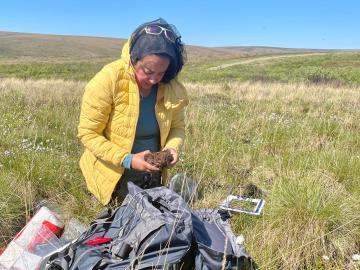
Filter News
Area of Research
News Type
News Topics
- (-) Advanced Reactors (2)
- (-) Artificial Intelligence (11)
- (-) Bioenergy (13)
- (-) Isotopes (2)
- 3-D Printing/Advanced Manufacturing (13)
- Big Data (3)
- Biology (13)
- Biomedical (2)
- Biotechnology (5)
- Buildings (7)
- Chemical Sciences (12)
- Composites (3)
- Computer Science (11)
- Coronavirus (3)
- Critical Materials (4)
- Cybersecurity (3)
- Education (3)
- Energy Storage (12)
- Environment (13)
- Exascale Computing (3)
- Frontier (4)
- Fusion (2)
- Grid (6)
- High-Performance Computing (13)
- Hydropower (1)
- Irradiation (1)
- Machine Learning (4)
- Materials (33)
- Materials Science (8)
- Mercury (1)
- Microscopy (4)
- Molten Salt (1)
- Nanotechnology (3)
- National Security (4)
- Neutron Science (13)
- Nuclear Energy (5)
- Partnerships (18)
- Physics (4)
- Polymers (2)
- Quantum Computing (6)
- Quantum Science (6)
- Security (2)
- Simulation (9)
- Summit (2)
- Transportation (13)
Media Contacts

Wildfires are an ancient force shaping the environment, but they have grown in frequency, range and intensity in response to a changing climate. At ORNL, scientists are working on several fronts to better understand and predict these events and what they mean for the carbon cycle and biodiversity.

Innovations in artificial intelligence are rapidly shaping our world, from virtual assistants and chatbots to self-driving cars and automated manufacturing.

In a discovery aimed at accelerating the development of process-advantaged crops for jet biofuels, scientists at ORNL developed a capability to insert multiple genes into plants in a single step.

ORNL’s electromagnetic isotope separator, or EMIS, made history in 2018 when it produced 500 milligrams of the rare isotope ruthenium-96, unavailable anywhere else in the world.

Nonfood, plant-based biofuels have potential as a green alternative to fossil fuels, but the enzymes required for production are too inefficient and costly to produce. However, new research is shining a light on enzymes from fungi that could make biofuels economically viable.
Oak Ridge National Laboratory scientists led the development of a supply chain model revealing the optimal places to site farms, biorefineries, pipelines and other infrastructure for sustainable aviation fuel production.

Oak Ridge National Laboratory scientists exploring bioenergy plant genetics have made a surprising discovery: a protein domain that could lead to new COVID-19 treatments.

Researchers at ORNL have developed a machine-learning inspired software package that provides end-to-end image analysis of electron and scanning probe microscopy images.

Mickey Wade has been named associate laboratory director for the Fusion and Fission Energy and Science Directorate at the Department of Energy’s Oak Ridge National Laboratory, effective April 1.

A technology developed at ORNL and used by the U.S. Naval Information Warfare Systems Command, or NAVWAR, to test the capabilities of commercial security tools has been licensed to cybersecurity firm Penguin Mustache to create its Evasive.ai platform. The company was founded by the technology’s creator, former ORNL scientist Jared M. Smith, and his business partner, entrepreneur Brandon Bruce.


